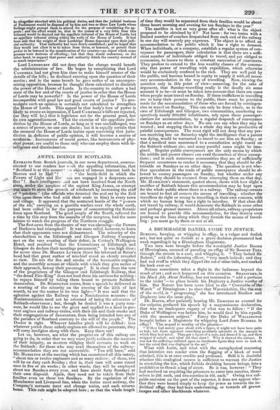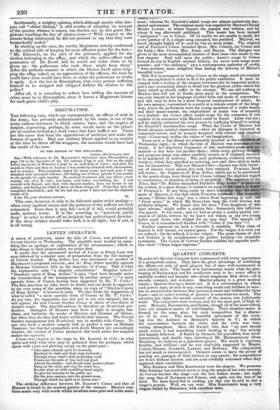A BRUMMAGEM DANIEL COME TO JUSTICE. BURNING, banging, or whipping
in effigy, is a vulgar and foolish act ; but not quite so foolish as a grave decision pronounced last week regarding it by a Birmingham Magistrate. Two men were brought before the worshipful Justice BOOTH of Ilirmingham, accused of parading an effigy of Sir ROBERT PEEL through the streets in a cart, and whipping it. " They lashed Sir Robert," said the informing officer, "very much indeed ; and they had red stuff in which they dipped the cat o'-nine-tails, and marked his back ever so."
Nature sometimes takes a flight in the ludicrous beyond the reach of art; and so it happened on this occasion. SHAKSPERE, in his Much Ado About Nothing, has not ventured to "add a perfume to the violet "—to place beside his Dogberry a Justice worthy of him. But Nature has been more kind to the "Constable of the Watch" of Birmingham : to show that Warwickshire, like the rest of the world, is "progressing," she has introduced Shallow and Dogberry into the same play. Dr. BOOTH, after patiently hearing Mr. EDMONDS as counsel for the culprits, prefaced his speech by a magnanimous declaration, that was no inadequate augury of what was to follow : "If the Duke of Wellington was before him, he would deal by him equally with the meanest subject." Fancy the Duke of WELLINGTON brought before a Magistrate for whipping Lord Jona RUSSELL in effigy ! The sequel is worthy of the proem- " If they had merely gone about with a figure, it might not have been quite so bad; but there appeared something peculiarly splenetic in the manner in which theylad acted. They got a figure of a man, and dressed it up, and then stripped it naked : and what did that show ? Why it showed the animus. It was not the sufferings inflicted upon an inanimate figure they were to look at, but the mind that was displayed in the act." What with Latin, and what with the metaphysical reasoning that intention can render even the flogging of a block of wood criminal, this is at once erudite and profound. Still it is doubtful whether this analogical reason is sufficient to warrant the Justice in stretching the law, which forbids drubbing human beings, into a prohibition to thrash a bag of' straw. So it was, however : "They had resolved on requiring the prisoners to enter into sureties, them- selves in 20/. each, and two sureties in 101. each." Owing to a cul- pable omission on the part of the reporter, it does not appear whe- ther they were bound simply to keep the peace as towards the in- dividual effigy they had been maletreating, or towards all graven images and other blockheads whatever.
Incidentally, a weighty opinion, which although merely what law- yers call " obiter dictum," is still worthy of attention on account of the quarter whence it comes, was thrown out by this grave Ma- gistrate touching the law of obstructions—" With respect to the streets being obstructed, he did not pretend to say that they were hermetically sealed."
In winding up the case, the worthy Magistrate strictly conformed to the critical rule of keeping his most effective point for the last- " Mr. Edmonds, on the part of the prisoners, applied for the clothes belonging to the effigy, and which the police-officer took possession of. Dr. Booth said he would not order them to be given up : the policeman who took them might keep them." After the pathetic manner in which the Doctor dwelt upon strip- ping the effigy naked, as an aggravation of the offence, the least he could have done would have been to order the policeman to clothe it again. Is it the law in Birmingham, that every person suffering himself to be stripped and whipped forfeits his clothes to the police I'
After all, it is consoling to reflect how trifling the amount of crime must be in Birmingham, since it leaves a Magistrate leisure for such grave child's play.



























 Previous page
Previous page